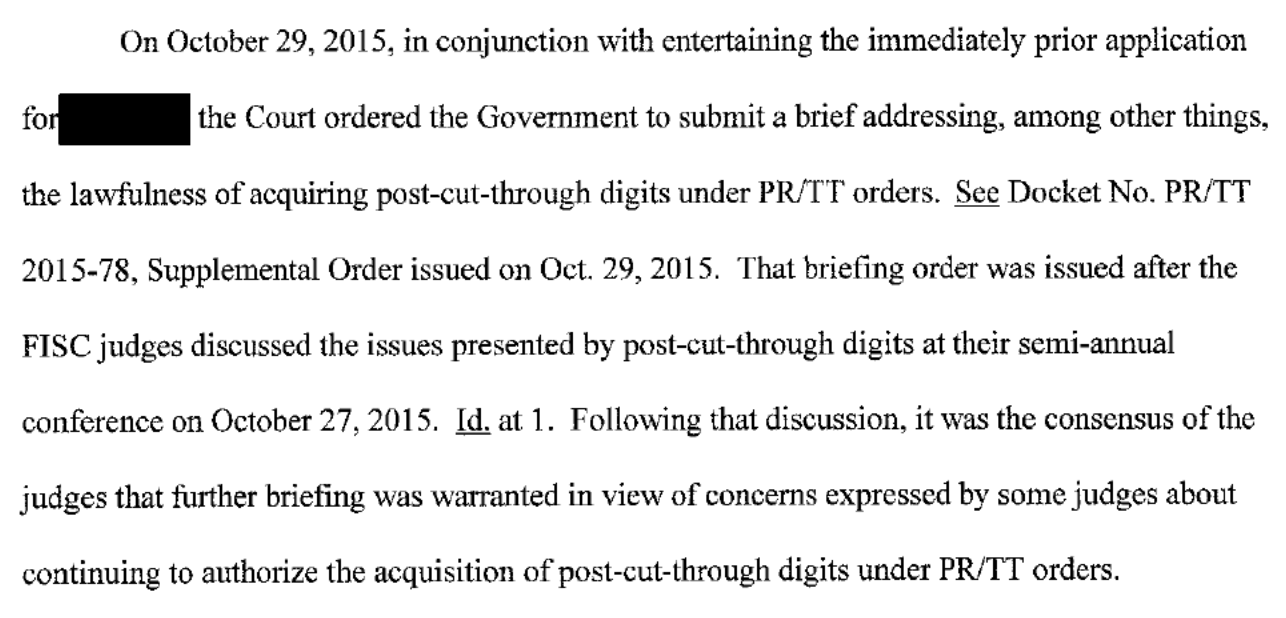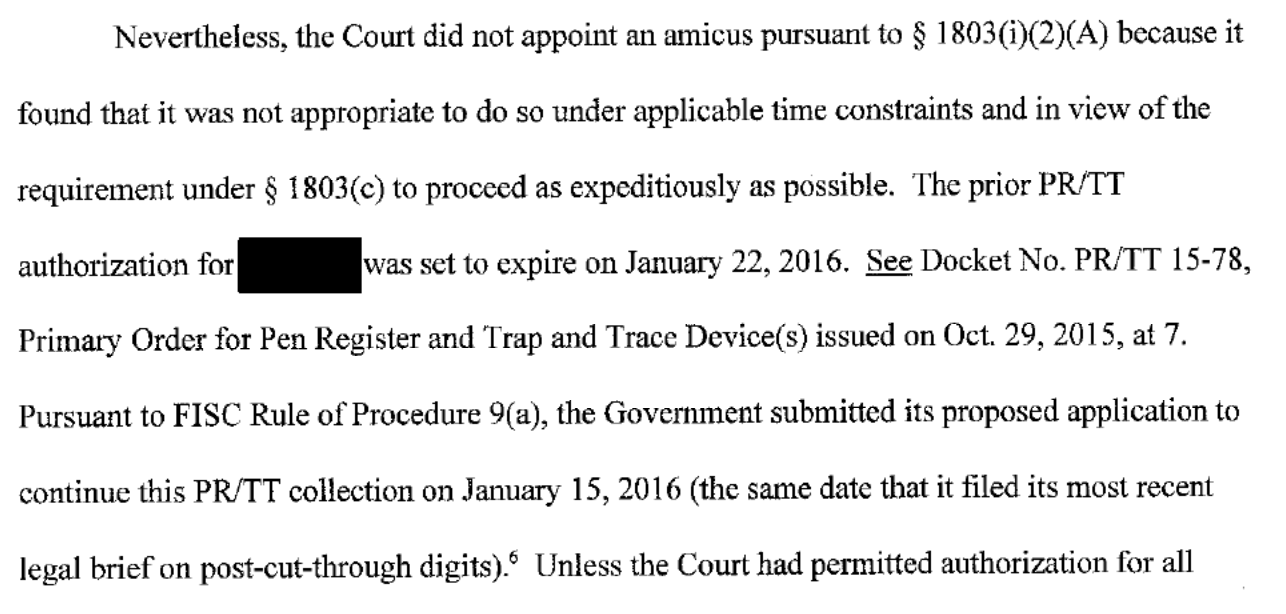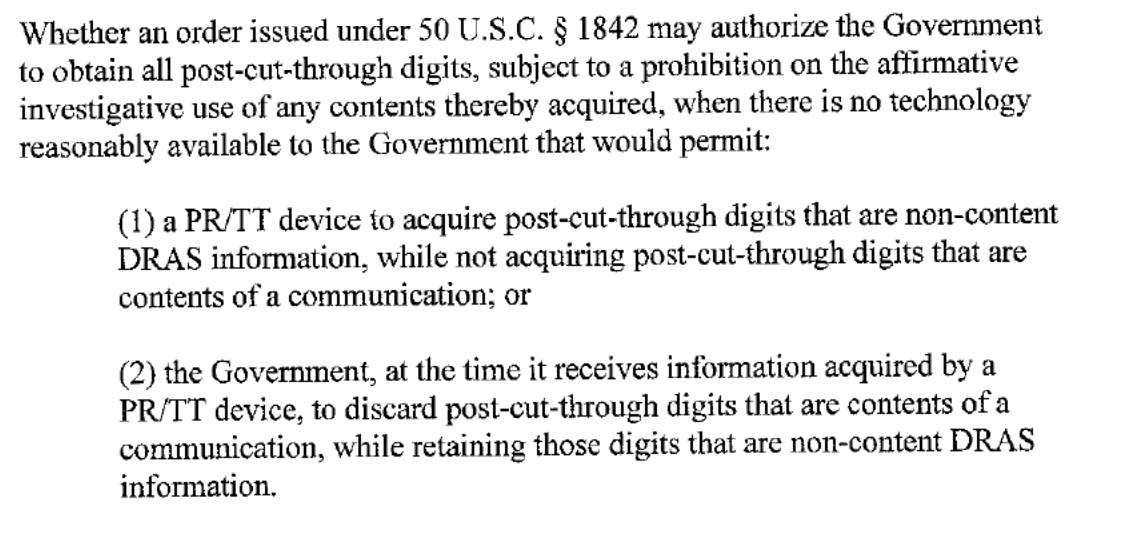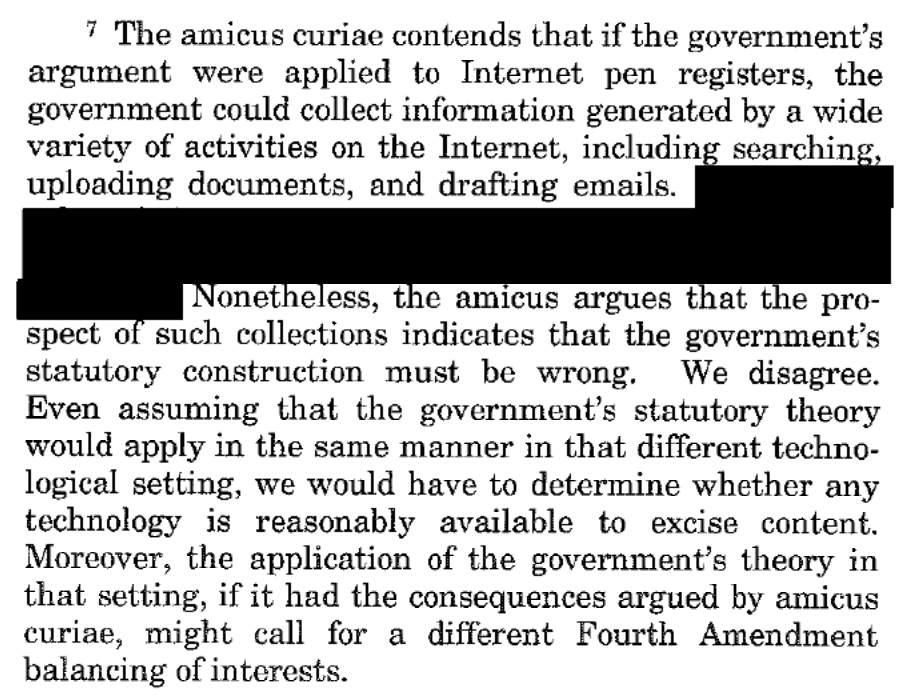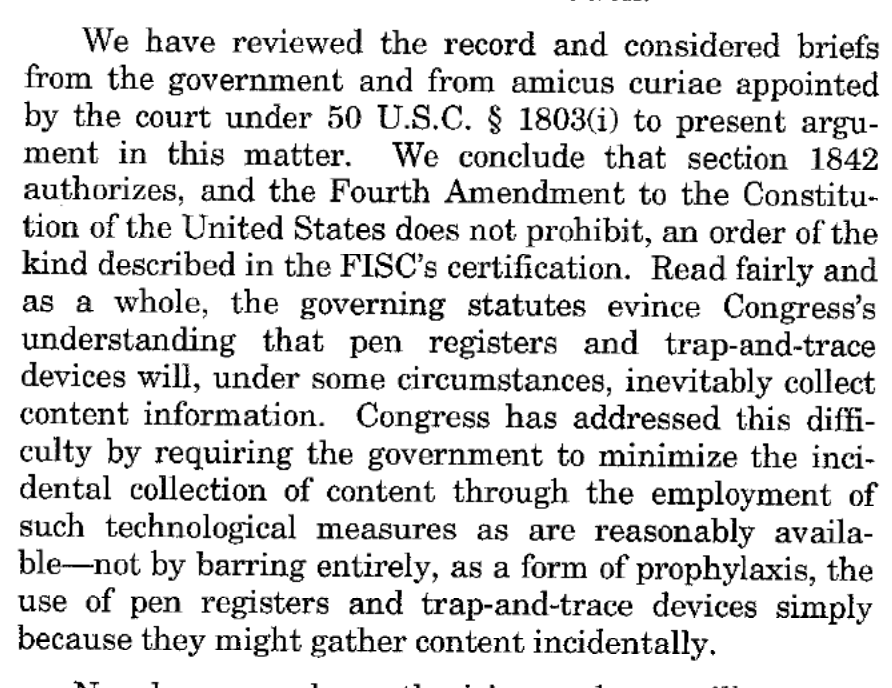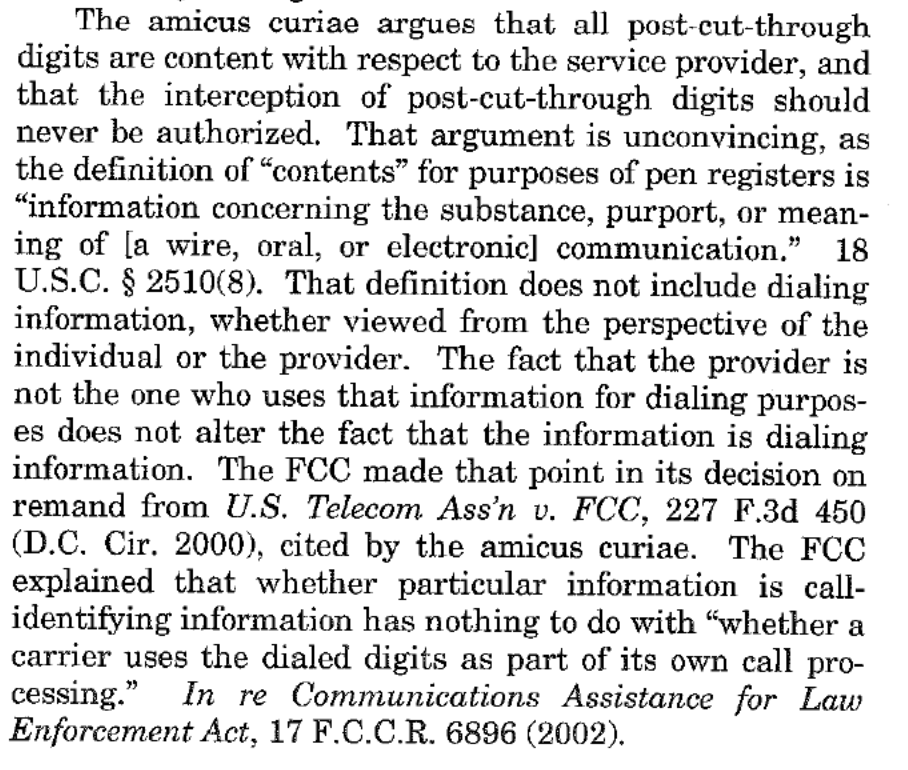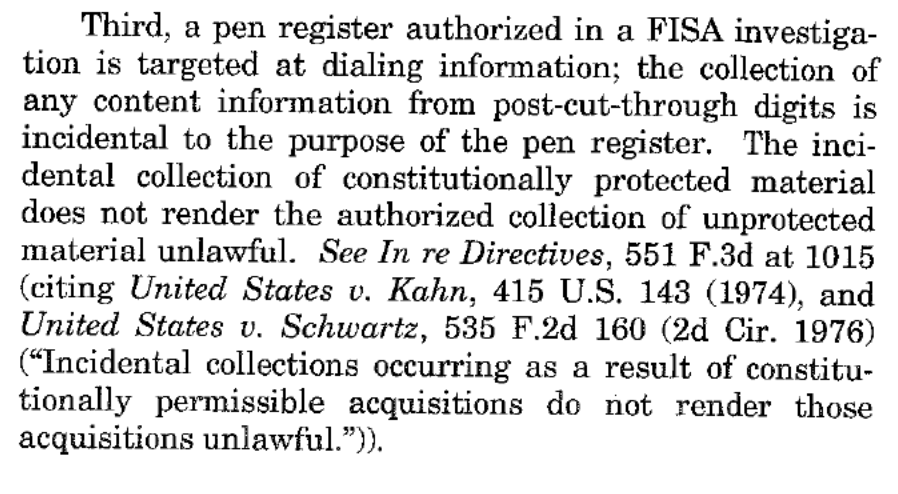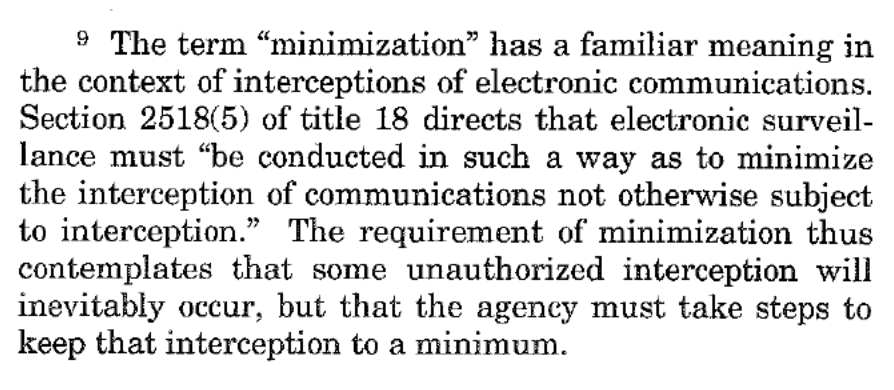In 2017, the Government Withdrew Three FISA Collection Requests Rather than Face an Amicus Review
Last year’s Section 702 Reauthorization law included a bunch of technical fix language describing how appeals of FISA Court of Review decisions should work.
In this post on that technical language, I speculated that Congress may have added the language in response to a denial of a request by the FISCR, about the only thing that would have identified the need for such language.
As one piece of evidence to support that hypothesis, I noted that one of the times the FISC consulted with an amicus (probably Amy Jeffress), it did not make the topic or the result public.
There’s one other reason to think there must have been a significant denial: The report, in the 2015 FISC report, that an amicus curiae had been appointed four times.
During the reporting period, on four occasions individuals were appointed to serve as amicus curiae under 50 U.S.C. § 1803(i). The names of the three individuals appointed to serve as amicus curiae are as follows: Preston Burton, Kenneth T. Cuccinelli II (with Freedom Works), and Amy Jeffress. All four appointments in 2015 were made pursuant to § 1803(i)(2)(B). Five findings were made that an amicus curiae appointment was not appropriate under 50 U.S.C. § 1803(i)(2)(A) (however, in three of those five instances, the court appointed an amicus curiae under 50 U.S.C. § 1803(i)(2)(B) in the same matter).
We know of three of those in 2015: Ken Cuccinelli serving as amicus for FreedomWorks’ challenge to the restarted dragnet in June 2015, Preston Burton serving as amicus for the determination of what to do with existing Section 215 data, and Amy Jeffress for the review of the Section 702 certifications in 2015. (We also know of the consultation with Mark Zwillinger in 2016 and Rosemary Collyer’s refusal to abide by USA Freedom Act’s intent on amici on this year’s reauthorization.) I’m not aware of another, fourth consultation that has been made public, but according to this there was one more. I say Jeffress was almost certainly the amicus used in that case because she was one of the people chosen to be a formal amicus in November 2015, meaning she would have been called on twice. If it was Jeffress, then it likely happened in the last months of the year.
I raise that background because of a detail in the FISC report released yesterday, showing its approvals for 2017. It revealed that FISC told the government on three occasions it might appoint an amicus. On all three occasions, the government withdrew the request rather than undergo a FISC review with even a limited adversary.
During the reporting period, no individual was appointed to serve as amicus curiae by the FISA courts. No findings were made in 2017, pursuant to 50 U.S.C. § 1803(i)(2)(A), that an amicus curiae appointment was not appropriate. There were three matters in which the Court advised the government that it was considering appointment of an amicus curiae to address a novel or significant question of law raised in proposed applications, but the government ultimately did not proceed with the proposed applications at issue, or modified the final applications such that they did not present a novel or significant question of law, thereby obviating a requirement for consideration as to the appropriateness of appointment of amicus. These matters are reflected in the table above as, respectively, a modification to a proposed order, an application denied in full, and an application denied in part. This is the first report including information about such occurrences. A similarly small number of such events occurred during prior reporting periods but were not discussed in the reports for those years.
In one case, the government withdrew an entire application after learning the FISC might appoint an amicus to review the proposed technique. In two others, the final order in one or another way did not include the requested practice.
These three instances are not the first time the government has withdrawn a request after learning FISC would invite adversarial review. While the court doesn’t reveal how many or in what years, it does say that a “similarly small number of such events occurred during prior reporting periods.” Given that there have been just two other reporting periods (the report for part of 2015 and the report covering all of 2016), the language seems to suggest it happened in both years.
That the government has been withdrawing requests rather than submitting them to the scrutiny of an amicus suggests several things.
First, it may be withdrawing such applications out of reluctance to share details of such techniques even with a cleared amicus, not even one of the three who served as very senior DOJ officials in the past. If that’s right, that would reflect some pretty exotic requests, because some of the available amici (most notably former Assistant Attorney General David Kris) have seen all that DOJ was approving with NatSec collection.
Second, remember that for at least one practice (the collection of location information), the government has admitted to opting to using criminal process rather than FISA where more lenient precedents exist in particular jurisdictions. That might happen, for example, if a target could be targeted in a state that didn’t require a warrant for some kinds of location data whereas FISC does.
Starting in 2017, the government would have the ability to share raw EO 12333 with the FBI, which might provide another alternative means to collect the desired data.
All of which is to say these withdrawals don’t necessarily mean the government gave up. Rather, past history has shown that the government often finds another way to get information denied by the FISC, and that may have happened with these three requests.
Finally, remember that as part of 702 reauthorization last year, Ron Wyden warned that reauthorization should include language preventing the government from demanding that companies provide technical assistance (which obviously includes, but is probably not limited to, bypassing or weakening encryption) as part of 702 directives. The threat the government might do so under 702 is particularly acute, because unlike with individual orders (which is what the withdrawn requests here are), the FISC doesn’t review the directives submitted under 702. Some of these withdrawn requests — which may number as many as nine — may reflect such onerous technical requests.
Importantly, one reason the government might withdraw such requests is to avoid any denials that would serve as FISC precedent for individualized and 702 requests. That is, if the government believed the court might deny an individual request, it might withdraw it and preserve its ability to make the very same demand in a 702 context, where the FISC doesn’t get to review the techniques use.
Whatever the case, the government has clearly been bumping up against the limits of what it believes FISC will approve in individualized requests. But that doesn’t mean it hasn’t been surpassing those limits via one or another technical or legal means.


![[Photo: National Security Agency, Ft. Meade, MD via Wikimedia]](https://www.emptywheel.net/wp-content/uploads/2017/08/NationalSecurityAgency_HQ-FortMeadeMD_Wikimedia.jpg)
